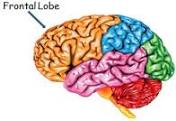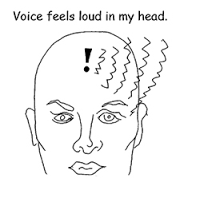There are certain queer times and occasions in this strange mixed affair we call life when a man takes this whole universe for a vast practical joke, though the wit thereof he but dimly discerns, and more than suspects that the joke is at nobody’s expense but his own
― Herman Melville, Moby-Dick
The third day after the accident, the friend from the English Department had gone to check on Paul. He engaged in conversation with  Dr. Prats, Paul’s neurosurgeon. The physician explained to the English professor that the trauma injured Paul’s
Dr. Prats, Paul’s neurosurgeon. The physician explained to the English professor that the trauma injured Paul’s  frontal lobe, a part of the brain responsible for many things, including cognitive thinking and personality.
frontal lobe, a part of the brain responsible for many things, including cognitive thinking and personality.
He added, “Until that portion of the brain is healed, Paul will likely experience personality changes, lack of attention, poor planning, loss of judgment and loss of motivation. But the only remedy is to continue to have  physical therapy to regain strength in his injured leg and ankle. While that physical therapy continues, it will give his brain a chance to heal.”
physical therapy to regain strength in his injured leg and ankle. While that physical therapy continues, it will give his brain a chance to heal.”
The next six weeks were painful. The July holidays came and went, but Paul continued to have difficulty interacting. He began to see his English professor friend as an enemy, not really interested in helping him, but interested in making him suffer. His hallucinations seemed to increase.
Finally, a psychiatrist was brought in to consult with Dr. Prats. He suggested a mild treatment regimen of low doses of  Xanax and Zyprexa. After two weeks, his symptoms had virtually disappeared. He was able to communicate and remember instructions. Finally, in September – just before the start of school – he was released to go home to his little house on Navarre Way. When he returned home, he found a card in his mailbox, indicating he had a registered letter at the Post office. He ignored the card, and retreated into his house.
Xanax and Zyprexa. After two weeks, his symptoms had virtually disappeared. He was able to communicate and remember instructions. Finally, in September – just before the start of school – he was released to go home to his little house on Navarre Way. When he returned home, he found a card in his mailbox, indicating he had a registered letter at the Post office. He ignored the card, and retreated into his house.
Paul was not progressing with the current medication. He was on the verge of a nervous breakdown. The hallucinations and voices were, in fact, getting worse. He went to see Dr. Prats, who recommended he see a psychiatrist affiliated with the UM Medical center. Dr. Prats made the arrangements, and Paul went to the psychiatrist’s office on Ponce de Leon Boulevard. His appointment was for 2 PM on Wednesday.
He entered the office, and somewhat to his surprise, saw that the psychiatrist was an older, Cuban woman. He described his symptoms to this  Dr. Emelina Arocha. She inquired if there was any history of mental issues in his family history. Paul spent the next 40 minutes, explaining about his rather unusual family history. He told Dr. Arocha that his father, Michael Fitzgerald, was a famous physicist and mathematician. Michael went to school at
Dr. Emelina Arocha. She inquired if there was any history of mental issues in his family history. Paul spent the next 40 minutes, explaining about his rather unusual family history. He told Dr. Arocha that his father, Michael Fitzgerald, was a famous physicist and mathematician. Michael went to school at  Cambridge University and then went to the
Cambridge University and then went to the  Bohr Institute for his post-graduate studies. His career was beginning to take off when he experienced a near-fatal fall while
Bohr Institute for his post-graduate studies. His career was beginning to take off when he experienced a near-fatal fall while  mountain climbing.
mountain climbing.
After he recovered, his father began to complain about the noise levels in the room. He required absolute silence when Paul was in his presence. Then Paul noticed that his father appeared to be having conversations with people who weren’t there. Eventually, his father had to be put into an institution. He died there six years later of a self-inflicted knife wound.
Paul elaborated on the rest of the family. His mother was a chronic abuser of alcohol and prescription sedatives. She was convicted of attempted murder when she was found to have left his younger brother out in the snow in Michigan where they lived. When the mother explained that voices told her to put him outside, the jury thought she was faking. She also died, after being paroled and from cirrhosis of the liver and kidney failure. His younger brother appeared to be normal, living in the family home in Michigan. He had no wife or family, hesitant to pass on these defective genes. Fortunately – for both Paul and his brother – his parents left them an estate valued in the tens of millions of dollars. Both of them could live very well off the interest alone.
After taking down this family history, and asking Paul an additional series of questions, Dr. Arocha felt she knew enough to make a preliminary diagnosis. She told Paul he was likely in the beginning stages of schizophrenia, brought on by family history, too much work, too little sleep, and the final insult of his traumatic brain injury.
 “Schizophrenia is a serious mental illness, one that we do not fully understand. It occurs in about one percent of the population, and yes, there is a definite genetic connection. Having an immediate family member suffering with schizophrenia as you presumably had, increases the likelihood of your being afflicted by the disease by a factor of ten. It uusually manifests itself in one’s late teens or early twenties. The disease affects men and women with about the same frequency, with symptoms that display differently between the genders. In your case, Paul, your underlying illness was brought to the fore because of environmental conditions. The last straw was your head injury in your accident.”
“Schizophrenia is a serious mental illness, one that we do not fully understand. It occurs in about one percent of the population, and yes, there is a definite genetic connection. Having an immediate family member suffering with schizophrenia as you presumably had, increases the likelihood of your being afflicted by the disease by a factor of ten. It uusually manifests itself in one’s late teens or early twenties. The disease affects men and women with about the same frequency, with symptoms that display differently between the genders. In your case, Paul, your underlying illness was brought to the fore because of environmental conditions. The last straw was your head injury in your accident.”
Paul asked, “What is likely to happen to me?”
Dr. Arocha replied, “I will prescribe a set of medications that we will adjust periodically. You can expect some side effects from these medications, but they will help you live a somewhat normal life.”
“Somewhat? Can I continue with my work at the University? What about my work on the Riemann Hypothesis?”
Dr. Arocha said, “Paul, I must be candid with you. You will likely experience three phases of the disease. The first – the one you are currently experiencing, is called the acute phase. The  hallucinations, the voices – all these are symptomatic of the acute phase. It can last from a few days up to a year. The second phase is the process of stabilization. The medication will help you get stabilized, and the symptoms of the disease will gradually abate. The third phase – stabilization – will likely be when you can resume work at the University and with your hypothesis.”
hallucinations, the voices – all these are symptomatic of the acute phase. It can last from a few days up to a year. The second phase is the process of stabilization. The medication will help you get stabilized, and the symptoms of the disease will gradually abate. The third phase – stabilization – will likely be when you can resume work at the University and with your hypothesis.”
“So you’re telling me I could be incapacitated for months with this thing? Doctor, I don’t have time for this. I need to get on with my work. Will these medications help me get to this stabilization phase faster?”
Dr. Arocha looked Paul squarely in the eye. “If you don’t take the medication, you could be stuck in the acute phase for weeks, months – maybe for a lifetime. You must immediately start with the medication, or I cannot help you.”
Paul accepted the  scrips from Dr. Arocha, and got them filled. But after a month on the meds, Paul found he was unable to concentrate on his work. In looking at the notes he’d made prior to his accident; none of them made any sense to him any more. In a vain attempt to try to regain his ability to do the work on the Riemann Hypothesis, he stopped taking the drugs.
scrips from Dr. Arocha, and got them filled. But after a month on the meds, Paul found he was unable to concentrate on his work. In looking at the notes he’d made prior to his accident; none of them made any sense to him any more. In a vain attempt to try to regain his ability to do the work on the Riemann Hypothesis, he stopped taking the drugs.
He decided the best thing to do was to return to work – that staying busy would make the voices quiet. He went to his office, and found all his belongings stuffed into several large boxes. Dr. Howar met him at the door to his office. She explained that, despite having tenure, he’d been fired from the university because of an accusation of sexual harassment, brought by one of his students.
Paul didn’t understand how this was possible. He did not remember having made the alleged overtures to Harper that caused his termination. When he tried to explain that to Dr. Howar, she called campus security. He was escorted from his office in the Physics Building, where he’d found a temporary home while the mathematics building was being torn down and another built in its place.
Paul could think of no alternatives. His friend the English professor had suggested he get a lawyer and sue the University. But Paul wasn’t quite sure his nerves were up to that much strain at present. He knew he had time to pursue that later. In the meantime, he’d returned home, and work on the Riemann.
